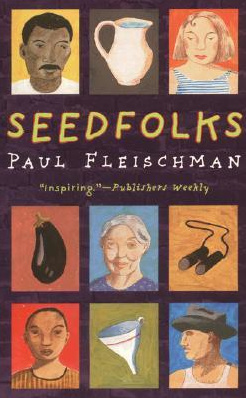

“Television, I'm afraid, has isolated us more than race, class, or ethnicity.”
― Paul Fleischman, quote from Seedfolks
“You can't see Canada across Lake Erie, but you know it's there. It's the same with spring. You have to have faith, especially in Cleveland. Snow in April always breaks your heart.”
― Paul Fleischman, quote from Seedfolks
“the ancient Egyptians prescribed walking through a garden as a cure for the mad.”
― Paul Fleischman, quote from Seedfolks
“Why do I need TV when I have forty-eight apartment windows to watch across the vacant lot, and a sliver of Lake Erie? I've seen history out this window. So much. I was four when we moved here in 1919. The fruit-sellers' carts and coal wagons were pulled down the street by horses back then. I used to stand just here and watch the coal brought up by the handsome lad from Groza, the village my parents were born in. Gibb Street was mainly Rumanians back then. It was "Adio" - "Good-bye"- in all the shops when you left. Then the Rumanians started leaving. They weren't the first, or the last. This has always been a working-class neighborhood. It's like a cheap hotel - you stay until you've got enough money to leave.”
― Paul Fleischman, quote from Seedfolks
“There's plenty about my life I can't change. Can't bring the dead back to life on this earth. Can't make the world loving and kind. Can't change myself into a millionaire. But a patch of ground in this trashy lot -- I can change that. Can change it big. Better to put my time into that than moaning about the other all day.”
― Paul Fleischman, quote from Seedfolks

“The sidewalk was completely empty. It was Sunday, early April. An icy wind teetered trash cans and turned my cheeks to marble. In Vietnam we had no weather like that. Here in Cleveland people call it spring.”
― Paul Fleischman, quote from Seedfolks
“[Community gardens] were oases in the urban landscape of fear, places where people could safely offer trust, helpfulness, charity, without need of an earthquake or hurricane...Community gardens are places where people rediscover not only generosity, but the pleasure of coming together. I salute all those who give their time and talents to rebuilding that sense of belonging.”
― Paul Fleischman, quote from Seedfolks
“We are all the people we have ever known. We carry them for the rest of our lives, across every border we cross”
― Michael Ondaatje, quote from Divisadero
“La muerte violenta no tolera ninguna intimidad. Saquea la propia dignidad tan rotundamente como ha arrebatado la vida. El cuerpo es manejado, escudriñado y fotografiado, y en cada paso del proceso se le aplica una nueva serie de dígitos. La víctima se convierte en parte de las pruebas, un objeto expuesto que se exhibe a policías, patólogos, especialistas forenses, abogados y, llegado el caso, jurados. Numeradlo; fotografiadlo; tomad muestras; ponedle una etiqueta en el pie. Aunque partícipe activa, no me resigno a aceptar lo impersonal del sistema. Es como un saqueo al nivel más personal. Por lo menos yo daría un nombre a esta víctima. La muerte en el anonimato no se sumaría a la lista de violaciones que él o ella deben sufrir.”
― Kathy Reichs, quote from Déjà Dead
“I’m a person who saves things. I’ll hold on forever. *”
― Jenny Han, quote from Always and Forever, Lara Jean
“After a long time and many questions, Satan said, "The spider kills the fly, and eats it; the bird kills the spider and eats it; the wildcat kills the goose; the -- well, they all kill each other. It is murder all along the line. Here are countless multitudes of creatures, and they all kill, kill, kill, they are all murderers. And they are not to blame, Divine One?”
― Mark Twain, quote from Letters from the Earth: Uncensored Writings
“The devil does not exist. I do not believe he exists. Nor do I believe the old saying that the devil's greatest accomplishment was to convince the majority of mankind that he does not exist. For me Satan and a literal hell are fables born of Christianity's desire to control humanity by increasing its fear of death. After all, I'm five thousands years old and I've never met Satan.”
― Christopher Pike, quote from Thirst No. 3: The Eternal Dawn
BookQuoters is a community of passionate readers who enjoy sharing the most meaningful, memorable and interesting quotes from great books. As the world communicates more and more via texts, memes and sound bytes, short but profound quotes from books have become more relevant and important. For some of us a quote becomes a mantra, a goal or a philosophy by which we live. For all of us, quotes are a great way to remember a book and to carry with us the author’s best ideas.
We thoughtfully gather quotes from our favorite books, both classic and current, and choose the ones that are most thought-provoking. Each quote represents a book that is interesting, well written and has potential to enhance the reader’s life. We also accept submissions from our visitors and will select the quotes we feel are most appealing to the BookQuoters community.
Founded in 2023, BookQuoters has quickly become a large and vibrant community of people who share an affinity for books. Books are seen by some as a throwback to a previous world; conversely, gleaning the main ideas of a book via a quote or a quick summary is typical of the Information Age but is a habit disdained by some diehard readers. We feel that we have the best of both worlds at BookQuoters; we read books cover-to-cover but offer you some of the highlights. We hope you’ll join us.